|
Be prepared THE BOY SCOUTS part 1 |
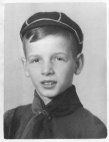 The webmaster as a cub. |
|
| "A Scout smiles and whistles under all circumstances." | ||
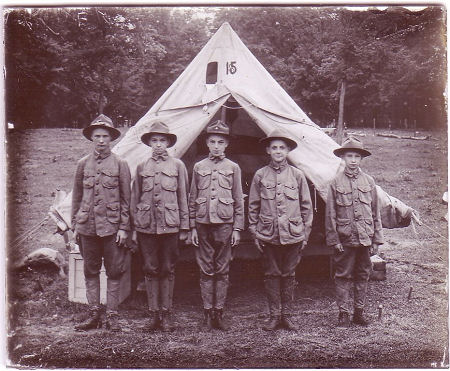
Unmounted glass slide of five boy scouts in uniform in front of a tent at an encampment. They wear the original uniforms that were modelled after the U.S. army uniforms with the multi-pocket coat and the breeches with leggings. (c. 1910) |
The Boy Scout movement was founded in Great Britain in 1908 by a cavalry officer Robert (later Lord)
Baden-Powell. In that year he had written a book called ‘Scouting for Boys’,
that described many games and contests that he had used to train his troops
in scouting, and became very popular among the boys of Great Britain.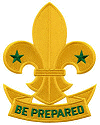 |
|
Chapter I. - IN CAMP WITH BADEN-POWELL.
|
|
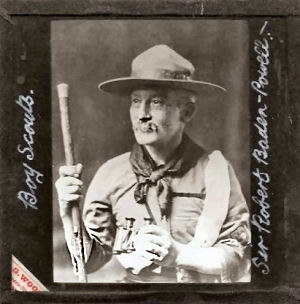 Baden-Powell's idea was that boys should organize themselves into small subgroups, of some seven boys, the so called patrols, under a boy leader. To become a scout a boy would promise to obey the scout law which included chivalrous behaviour and encouraged to do a good deed every day. The symbols of the scouts include the handshake with the left hand, the fleur-de-lis badge, and the motto 'Be Prepared'. Though B.P. had intended his ideas to be used by youth organisations in Great Britain only, the Boy Scouts quickly spread to other countries. By the late 20th century there were Boy Scout organisations in 110 nations. Since 1920 international meetings, called 'jamborees' have been held every four years. At the first Jamboree in London B.P. was given the title 'chief-scout of the world'. In 1937 the Jamboree was held for the first time in the Netherlands, in Vogelenzang; the second was in Dronten, 1995. In 1910 Baden-Powell founded the Girl Guides in Great Britain in response to the requests of girls who were interested in the Boy Scout movement. Though the scouting movement was initially intended for boys from 11 to 15, he founded a parallel organization for younger boys, the Wolf Cubs in 1910. Photo: Robert Baden-Powell, portrayed at a 3.25 inches square photographic magic lantern slide. 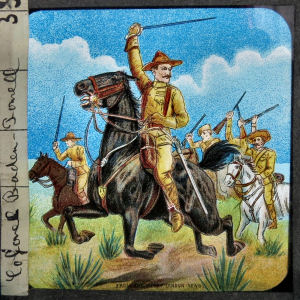 Boer War, Colonel Baden-Powel, Founder of the Scouts. Slide 8.2 x 8.2 cm. |
2. Hoisting the Flag.
The Scouts are to be true patriots, and so the national flag is hoisted over the
camp, and, as it flutters upon the breeze, is saluted with all due honour
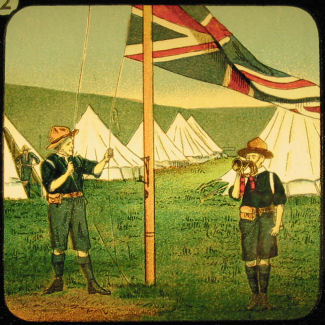 and
respect. But does the General want to foster the military spirit-to train an
army of juvenile soldiers? By no means. There are peace Scouts as well as
war Scouts, he says, and he believes in this free, open-air life, under
discipline and with every incentive to self-reliance and self-control as the
very best means to foster the spirit of good citizenship. Raleigh, and
Drake, and Capt. John Smith, in the days of Elizabeth; Capt. Cook and Lord
Clive; Ross and Franklin amid the Arctic snows; Speke, and Baker, and
Livingstone, cutting their way through the forests of tropical Africa: these
are the examples the General holds up for imitation - pioneers of empire,
but good citizens, good men, peace Scouts. and
respect. But does the General want to foster the military spirit-to train an
army of juvenile soldiers? By no means. There are peace Scouts as well as
war Scouts, he says, and he believes in this free, open-air life, under
discipline and with every incentive to self-reliance and self-control as the
very best means to foster the spirit of good citizenship. Raleigh, and
Drake, and Capt. John Smith, in the days of Elizabeth; Capt. Cook and Lord
Clive; Ross and Franklin amid the Arctic snows; Speke, and Baker, and
Livingstone, cutting their way through the forests of tropical Africa: these
are the examples the General holds up for imitation - pioneers of empire,
but good citizens, good men, peace Scouts. |
|
3. Morning Toilet. The morning toilet
starts the daily life of the Camp: it's a simple operation, if an important
one. A bit of soap, a towel, a bucket of water from the
|
|
4. Cutting Wood.
We want wood for
our Camp-fire, poles for our huts or tents, or other purposes. So off we go
to the woods to cut it - of course, having obtained
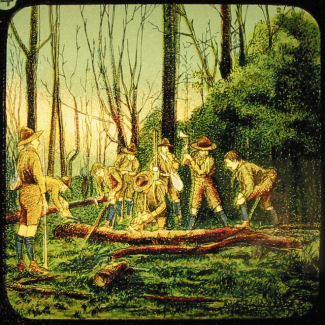 permission first. Every Scout should know how to use an axe or bill-hook for chopping
down small trees and branches. You think it's very easy, and so it is, when
you know how - like a good many other things. But, "it is a matter of
practice to become a woodcutter, and you have to be very careful at first,
lest in chopping you miss the tree, and chop your own leg." There's another
wrinkle for you. And whilst you are in the woods, the General will tell you
all sorts of yarns about the Scouts, red, and white, and black, whom he has
met on the frontiers of the Empire, of men lost in the woods, and how to
find your way by noticing landmarks, and to tell in what direction the wind
is blowing by throwing up little bits of dry grass, or holding up your wet
thumb and noticing which side feels coldest. Or you may learn
something of how wild animals are tracked by their spoor, or of the trees
and plants which grow around you - for all these things belong to "Woodcraft,"
and that is one of the Scout's accomplishments.
permission first. Every Scout should know how to use an axe or bill-hook for chopping
down small trees and branches. You think it's very easy, and so it is, when
you know how - like a good many other things. But, "it is a matter of
practice to become a woodcutter, and you have to be very careful at first,
lest in chopping you miss the tree, and chop your own leg." There's another
wrinkle for you. And whilst you are in the woods, the General will tell you
all sorts of yarns about the Scouts, red, and white, and black, whom he has
met on the frontiers of the Empire, of men lost in the woods, and how to
find your way by noticing landmarks, and to tell in what direction the wind
is blowing by throwing up little bits of dry grass, or holding up your wet
thumb and noticing which side feels coldest. Or you may learn
something of how wild animals are tracked by their spoor, or of the trees
and plants which grow around you - for all these things belong to "Woodcraft,"
and that is one of the Scout's accomplishments. |
|
5. Provisions for the Camp. Well,
we have got our wood, and return to Camp. Hooray! here's
the provision wagon: now for dinner. We learn some of the mysteries of
Camp-cooking. "The three B's of life in Camp
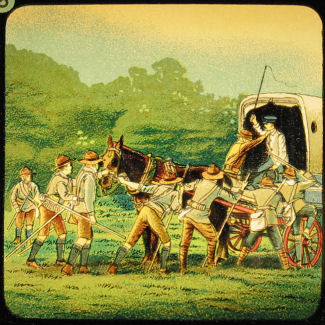 are
the ability to cook bannocks, beans, and bacon." Bannocks are cakes or buns
cooked in the hot ashes of the Camp-fire-but if we want real bread, we must
have some sort of oven - an old earthenware pot or tin box, the fire piled
over it, or a clay oven more or less properly built. Or we may twist a strip
of dough round a stout club, carefully peeled and heated, and stuck into the
ground close to the fire to toast. Only we mustn't let our bread burn in
either case, and of course Scouts never do let it burn. As for our bacon, we
may fry it or boil it, and we shall certainly boil our beans and our
potatoes, if we have any, and make some tea in our tin "billy"; and what
more do you want in the way of a square meal? But these are only the
rudiments of Scout cookery: cooking meat in a coating of clay, making
"hunter's stew," or roasting "Kabobs " - these are the higher developments
of the art: we shall learn all about them in Camp with Baden-Powell. are
the ability to cook bannocks, beans, and bacon." Bannocks are cakes or buns
cooked in the hot ashes of the Camp-fire-but if we want real bread, we must
have some sort of oven - an old earthenware pot or tin box, the fire piled
over it, or a clay oven more or less properly built. Or we may twist a strip
of dough round a stout club, carefully peeled and heated, and stuck into the
ground close to the fire to toast. Only we mustn't let our bread burn in
either case, and of course Scouts never do let it burn. As for our bacon, we
may fry it or boil it, and we shall certainly boil our beans and our
potatoes, if we have any, and make some tea in our tin "billy"; and what
more do you want in the way of a square meal? But these are only the
rudiments of Scout cookery: cooking meat in a coating of clay, making
"hunter's stew," or roasting "Kabobs " - these are the higher developments
of the art: we shall learn all about them in Camp with Baden-Powell. |
|
|
|
|
| Personal
memories: When I was a young boy, we’re talking about the fifties, I, like so many of my friends, was a member of the Dutch ‘padvinderij’ (scouting). We met each other every Saturday afternoon in our club house, actually a converted garage, and submitted ourselves to the sometimes rather remarkable ceremonies. 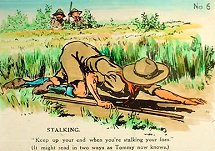 For instance at the beginning of the meeting we had to run from every nook and cranny of the club house to the middle of the room, where we had to strike up the yell 'Akela, wij doen ons best, wij dob, dob, dob, dob, dob!' (Akela we do our utmost, we dou, dou, dou, dou, dou!), while we squatted in a wide circle around the leader. I don’t remember what we did the rest of the afternoon. In those days we still wore a uniform, the young ones, the 'welpen' (cubs) had a small green cap on their head, the older ones, de 'verkenners' (scouts), a hat with a broad brim like the ones we otherwise only saw in movies about the Canadian mounted police. The leaders of the cubs had odd names like 'Cheel', 'Baloo' and 'Baghera', the names of leading characters in Kiplings’ Jungle Book, We wore a triangular scarf around our neck; every group using its own colours, and the cubs as well as the scouts always wore shorts, summer and winter alike, though the 'shorts' of the leaders often reached far over the knees. It was a rather ridiculous sight, yet it came into fashion when I was older. However I always flatly refused to buy such a pair of that 'Scoutmaster’s shorts'. As a Boy Scout you were expected to do (at least) one good turn every day. As an example was given to help an old lady cross the street. There will have been a lot of old women at that time who were just loitering for a moment on the side of the road and were 'helped' reluctantly. |
7. A Camp Loom.
There's no end to the useful information we pick up during the daily life of
the camp. Look at this Camp-loom, for instance.
|
|
8. Round the Camp Fire.
Then in the evening twilight, we gather round the clasp fire and listen to
yarns from Baden-Powell. He talks of the boy Scouts of Mafeking; of tracking and spooring; of
reading "sign" and the value of deduction;
|
|
|
Chapter II. - CAMPAIGNING. |
|
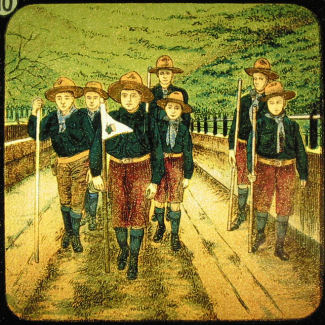 10. A Patrol on the March. Let us join a patrol of Scouts on the march. We are a party of six, besides the patrol leader – a cheery little party - and we smile and whistle as we go along, for that is a part of Scout Law. It is written in the eighth article: "A Scout smiles and whistles under all circumstances. Scouts never grouse at hardships, nor whine at each other, nor swear when put out. When you just miss a train, or someone treads on your favourite corn - not that a Scout ought to have such things as corns - or under any annoying circumstances, you should force your self to smile at once, and then whistle a tune, and you will be all right." So off we start, our patrol flag waving merrily before us; we cross a bridge, and get out into the open country, carefully noting land marks as we go along, distant hills; church towers, and nearer objects, such as peculiar buildings, trees, gates, rocks, etc. By-and-bye, we shall have to find our way hack, and then this knowledge will be useful. |
|
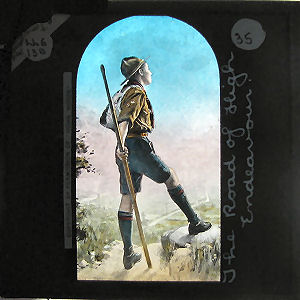 Personal memories: The scouts had their own rituals too. We were supposed to shake hands with other scouts using our left hand, and that while my teacher did her utmost to learn me writing with my right hand years before. We regularly had to fall in lined up, armed with a long stick which was, as we learned, suitable for everything. One could build a hut with it and…. eh…….. build a bridge with it, well, very useful anyway. 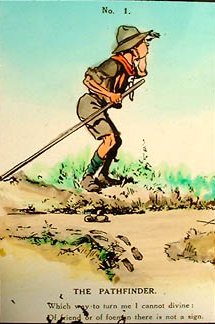 We had a Patrol Leader (PL) and an Assistant Patrol Leader (APL) and the patrols were named after birds, like Falcons and Blackbirds. My PL was named Erik Zilverentand (Eric Silvertooth). That could have been a contrived name in this 'between-fantasy-and-reality-world', but it was real. 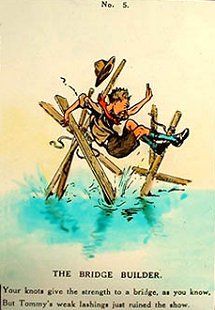 Neither do I remember how we spent our afternoons during my time as a scout. I suppose we…… eh…. built huts. Or bridges.  Series of Dutch post stamps, published on the occasion of the World Jamboree 1937 in the Netherlands. |
11. Scaling a Wall.
As we cross a common, we come across a larger body of Scouts; they are working in a
|
12.
Through the woods. We cross a stretch of country broken up
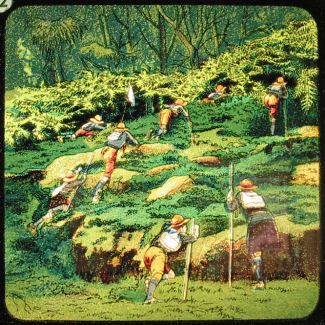 with rocks and
heather, and creep cautiously from one shelter to another. A Scotch fellow
has joined us, he wears a kilt instead of "shorts" like the rest of us. Now
we are through the bracken and among the trees of the wood beyond. Tread
lightly - the snapping of a dry twig may betray us to the other side if they
have got into this wood. Hide! hide! Behind the tree trunks. Evidently they
are not here, for we are through the little wood and have reached the open
fields beyond. On we go at the "Scout's pace," i.e:, walking and running
alternately from one point of cover to another. with rocks and
heather, and creep cautiously from one shelter to another. A Scotch fellow
has joined us, he wears a kilt instead of "shorts" like the rest of us. Now
we are through the bracken and among the trees of the wood beyond. Tread
lightly - the snapping of a dry twig may betray us to the other side if they
have got into this wood. Hide! hide! Behind the tree trunks. Evidently they
are not here, for we are through the little wood and have reached the open
fields beyond. On we go at the "Scout's pace," i.e:, walking and running
alternately from one point of cover to another. |
|
|
13. Look before you Leap.
We come to a little stream which we have to cross. "Look before you leap!" - it's
a good thing we did, or some of us would have got a ducking. This
brook will not check our advance, our poles soon help us across - but it
reminds us of a talk about bridges in our last Camp Fire Yarn.
|
|
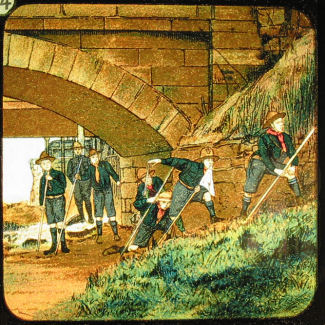 14.
Taking Shelter. Of course, when you are campaigning you have to take
things as they come. The sun does not always shine upon the Scout any more
than He does upon other people, so when you get caught in a shower you don't
grumble, but seek shelter under a hedge or a haystack, or perhaps under a
railway bridge, like this - and there you grin and bear it - or whistle and
smile, like a true Scout, until the clouds roll by and the sun comes out
again. Or perhaps you think of the Scout's motto, "Be prepared," and wish
you had brought your macintosh-especially if the rain is obstinate, and
won't stop, as is sometimes the case. But who minds a few drops of rain,
anyhow? Certainly not the Scout. 14.
Taking Shelter. Of course, when you are campaigning you have to take
things as they come. The sun does not always shine upon the Scout any more
than He does upon other people, so when you get caught in a shower you don't
grumble, but seek shelter under a hedge or a haystack, or perhaps under a
railway bridge, like this - and there you grin and bear it - or whistle and
smile, like a true Scout, until the clouds roll by and the sun comes out
again. Or perhaps you think of the Scout's motto, "Be prepared," and wish
you had brought your macintosh-especially if the rain is obstinate, and
won't stop, as is sometimes the case. But who minds a few drops of rain,
anyhow? Certainly not the Scout. |
|
|
15. Tea Time. The
first essential for getting some tea is to have a fire to boil the kettle,
or the "billy." Can you light a fire - not in the kitchen grate - but in the
open, and without setting fire to the grass or bush around it? Many bad
bush-fires have been caused by young tenderfoots fooling about with blazes
which they imagined to be camp fires.
|
|
| About the slides on this page:
The Boy Scouts: Three sets of the Junior Lecturer series numbered 782/784 entitled 'Boy Scouts' (The three parts are entitled: In Camp with Baden Powell - Campaigning - Scout Law and Chivalry). Original readings. The Junior Lecturers Series was produced by W. Butcher & Sons, London (1870-1906) and the slides were sold as three sets of eight, each in a cardboard box, for about 3/6 per set. Sizes 3.25" square. Cartoons: Some slides of a set of magic lantern slides, all with a humorous Scouting theme. The pictures tell the story of little Tommy when he joined the Scouts and went off to camp, all in full colour. 3.25" square. |
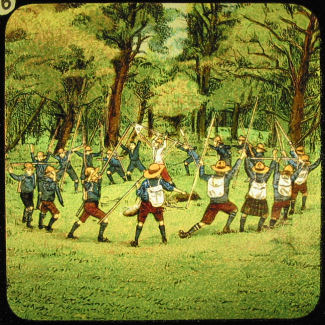 16.
Scouts' War Dance. The Scout, as we have seen, is encouraged to whistle; he is also
called upon to sing and dance. His war dance is a great sight.
The Scouts are arranged in a circle and slowly move round, singing the "Ingonyama"
song and stamping in unison on the long notes. In turn they
advance into the centre of the circle and go through a war dance, showing
how they have tracked and fought one of their enemies, or stalked and killed
a wild buffalo, the chorus going on all the time, now soft, now louder, as
the dancers get more excited. Here are the words: 16.
Scouts' War Dance. The Scout, as we have seen, is encouraged to whistle; he is also
called upon to sing and dance. His war dance is a great sight.
The Scouts are arranged in a circle and slowly move round, singing the "Ingonyama"
song and stamping in unison on the long notes. In turn they
advance into the centre of the circle and go through a war dance, showing
how they have tracked and fought one of their enemies, or stalked and killed
a wild buffalo, the chorus going on all the time, now soft, now louder, as
the dancers get more excited. Here are the words:Leader: "Een gonyâma - gonyâma." Chorus : "Invooboo, Yah bô! Yah bô! Invooboo." The meaning is : Leader; "He is a lion!" Chorus: "Yes ! he better than that : he is a hippopotamus!" No doubt this is supposed to be a great compliment; anyway, the war dance of the Scouts, seen in the fitful light of the camp fire, is just the thing to end up a day's campaigning. |
| Beautiful slide with the portrait of Lord Baden-Powell. The slide measures 3.25"x 3.25" (8.2 cm x 8.2 cm) and is signed 'Photo by Elliott & Fry'. |
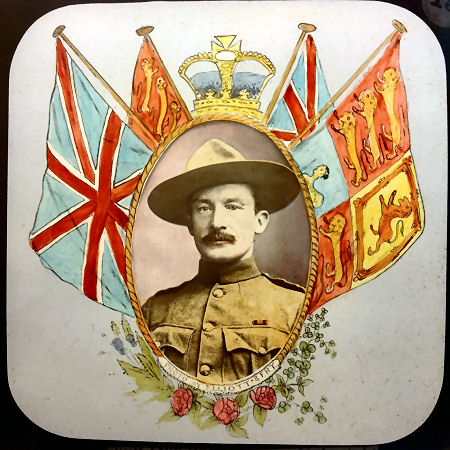 |
| Part 2......... | |
| |
©1997-2021 'de Luikerwaal' All rights reserved. Last update: 02-06-2021. |
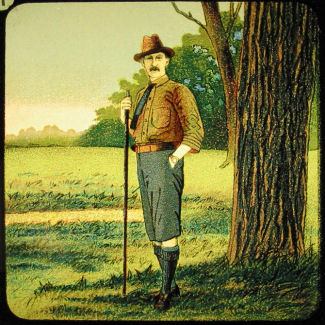 1. Lieut.-Gen. Baden-Powell, C.B.
Gen. Baden-Powell is one of the
favourites of the great British public, and especially of the younger
portion of them, the British boys. They remember how bravely he defended the
little South African town of Mafeking during the anxious days of the Boer
war: and though those days are over, and Briton and Boer have shaken hands
and are now the best of friends - he is still their hero, for has he not
started the Boy Scouts' movement? Is he not their founder, their patron,
their friend? Two years ago one had scarcely heard of the Scouts: to-day
they number 150,000 in the United Kingdom alone, and the growth of the
movement is equally remarkable in the Colonies - Canada, Australia, New
Zealand, South Africa-as well as in Germany, France and Holland. Gen.
Baden-Powell has set his heart. upon improving the boyhood of the nation,
upon training them to become good patriots and good citizens, men leading
healthy, wholesome God-fearing lives, a credit and a strength to their
native land. And so we all wish success to the Boy Scouts, and are rather
inclined to envy those fortunate few who have a chance to spend a fortnight
in camp with Baden-Powell. This portrait of the General was taken in camp,
and shows him in his campaigning outfit. The stick which he holds has an
interesting story: it was taken from a Boer farm during the days of the war.
1. Lieut.-Gen. Baden-Powell, C.B.
Gen. Baden-Powell is one of the
favourites of the great British public, and especially of the younger
portion of them, the British boys. They remember how bravely he defended the
little South African town of Mafeking during the anxious days of the Boer
war: and though those days are over, and Briton and Boer have shaken hands
and are now the best of friends - he is still their hero, for has he not
started the Boy Scouts' movement? Is he not their founder, their patron,
their friend? Two years ago one had scarcely heard of the Scouts: to-day
they number 150,000 in the United Kingdom alone, and the growth of the
movement is equally remarkable in the Colonies - Canada, Australia, New
Zealand, South Africa-as well as in Germany, France and Holland. Gen.
Baden-Powell has set his heart. upon improving the boyhood of the nation,
upon training them to become good patriots and good citizens, men leading
healthy, wholesome God-fearing lives, a credit and a strength to their
native land. And so we all wish success to the Boy Scouts, and are rather
inclined to envy those fortunate few who have a chance to spend a fortnight
in camp with Baden-Powell. This portrait of the General was taken in camp,
and shows him in his campaigning outfit. The stick which he holds has an
interesting story: it was taken from a Boer farm during the days of the war.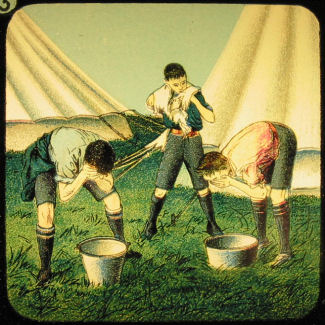 spring, and there you are. If you haven't brought a tooth-brush, make one with a dry
stick, frayed out at the end. That's wrinkle No.1; it's marvellous what a
lot of things you'll learn in a Scouts' Camp! You'll learn the value of
personal cleanliness - the value of tidiness. Listen to the General: "The
Camp ground should always be kept clean and tidy, not only to keep flies
away, but also because if you go away to another place, and leave an untidy
ground behind you, it gives so much important information to enemy's Scouts.
For this reason Scouts are always tidy, whether in camp or not, as a matter
of habit. If you are not tidy at home you won't be tidy in camp; and if
you're not tidy in camp, you will be only a tenderfoot and no Scout." Isn't
that good advice?
spring, and there you are. If you haven't brought a tooth-brush, make one with a dry
stick, frayed out at the end. That's wrinkle No.1; it's marvellous what a
lot of things you'll learn in a Scouts' Camp! You'll learn the value of
personal cleanliness - the value of tidiness. Listen to the General: "The
Camp ground should always be kept clean and tidy, not only to keep flies
away, but also because if you go away to another place, and leave an untidy
ground behind you, it gives so much important information to enemy's Scouts.
For this reason Scouts are always tidy, whether in camp or not, as a matter
of habit. If you are not tidy at home you won't be tidy in camp; and if
you're not tidy in camp, you will be only a tenderfoot and no Scout." Isn't
that good advice?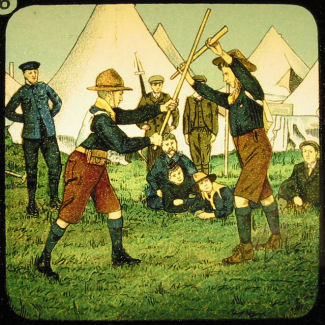
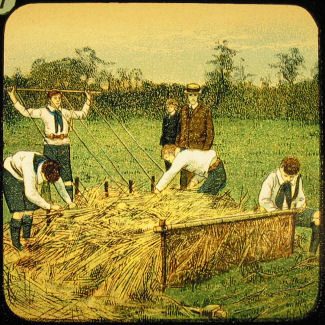 You
want a spring-mattress? All right - collect dry bracken, fern, grass,
heather, straw, and so on, and then to work. Drive a row of stakes, 2 ft. 6
in. wide firmly into the ground: opposite to them, at a distance of 6 or
7ft., plant another row, or two stakes and a crossbar, as in the picture.
Connect your two rows of stakes with stout cords, carrying the continuation
of the cords back over No.1 row for some 5ft. extra, and there fasten them
to a loose crossbar or " beam." This beam is then moved up and down at slow
intervals by one Scout, while the remainder lay bundles of bracken or straw,
&c., in layers alternately under and over the stretched strings, which are
thus bound in by the rising and falling of the beam. With this loom you can
also make grass or straw mats, with which to form tents or shelters, walls
or even carpets.
You
want a spring-mattress? All right - collect dry bracken, fern, grass,
heather, straw, and so on, and then to work. Drive a row of stakes, 2 ft. 6
in. wide firmly into the ground: opposite to them, at a distance of 6 or
7ft., plant another row, or two stakes and a crossbar, as in the picture.
Connect your two rows of stakes with stout cords, carrying the continuation
of the cords back over No.1 row for some 5ft. extra, and there fasten them
to a loose crossbar or " beam." This beam is then moved up and down at slow
intervals by one Scout, while the remainder lay bundles of bracken or straw,
&c., in layers alternately under and over the stretched strings, which are
thus bound in by the rising and falling of the beam. With this loom you can
also make grass or straw mats, with which to form tents or shelters, walls
or even carpets.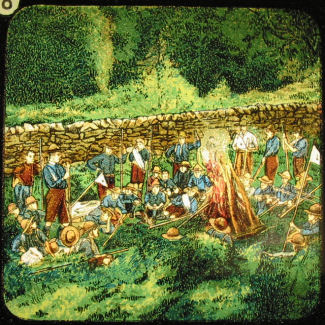 of
wild animals and their ways; of life on the African Veldt, or in the
backwoods; of the stars above us, and the grass beneath our feet; of
endurance, and chivalry, and life-saving-of our duty to God and man.
"Religion," says he, " is a very simple thing : 1st. To believe in God. 2nd.
'To do good to other people." We feel that he is practicing what he
preaches, and thoroughly deserves the letters of thanks that he receives
from his Scouts when Camping-days are over. Hear what one of them, a working
boy, says: "The most important thing that a great many boys need to learn is
to look at the bright side of things and to take everything by the smooth
handle. I myself found that a great lesson, and I shall never find words
enough to thank you for teaching me it. I have already found it a great help
even in everyday life."
of
wild animals and their ways; of life on the African Veldt, or in the
backwoods; of the stars above us, and the grass beneath our feet; of
endurance, and chivalry, and life-saving-of our duty to God and man.
"Religion," says he, " is a very simple thing : 1st. To believe in God. 2nd.
'To do good to other people." We feel that he is practicing what he
preaches, and thoroughly deserves the letters of thanks that he receives
from his Scouts when Camping-days are over. Hear what one of them, a working
boy, says: "The most important thing that a great many boys need to learn is
to look at the bright side of things and to take everything by the smooth
handle. I myself found that a great lesson, and I shall never find words
enough to thank you for teaching me it. I have already found it a great help
even in everyday life."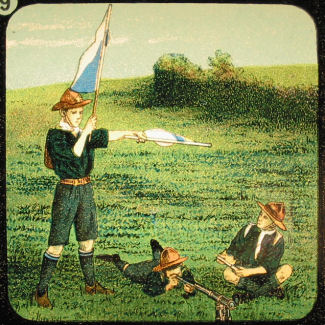 -
also by means of the signal codes of the Morse and semaphore systems. In the
former of these - the "dot and flash" system - the letters are represented
by waving a flag either slowly or rapidly; in the latter, by waving your
arms at different angles to each other. Signals are also given by means of
the whistle which every Scout carries on his lanyard, by bugle call, and -
by the distinctive flags carried by the patrols - the flags which mark –
them as belonging to the "Ravens," or the "Owls," or the "Lions," or the
"Kangaroos," as the case may be. Even the Scout's pole is pressed into the
signal service, and has its meaning when held in various positions. There
are also some recognized signs-arrows, circles, etc.- to be marked on the
wall or on the ground, which mean "Gone home," "This path not to be
followed," and so on.
-
also by means of the signal codes of the Morse and semaphore systems. In the
former of these - the "dot and flash" system - the letters are represented
by waving a flag either slowly or rapidly; in the latter, by waving your
arms at different angles to each other. Signals are also given by means of
the whistle which every Scout carries on his lanyard, by bugle call, and -
by the distinctive flags carried by the patrols - the flags which mark –
them as belonging to the "Ravens," or the "Owls," or the "Lions," or the
"Kangaroos," as the case may be. Even the Scout's pole is pressed into the
signal service, and has its meaning when held in various positions. There
are also some recognized signs-arrows, circles, etc.- to be marked on the
wall or on the ground, which mean "Gone home," "This path not to be
followed," and so on.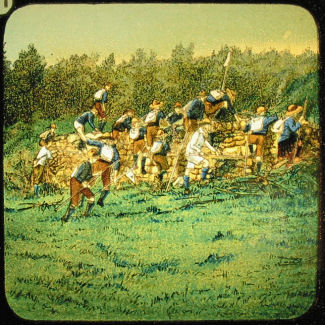 different direction to ourselves, and make a dash for a wall on our right. Over they
go, helter-skelter, and are soon lost to sight in the woods beyond. It's the
good old game of "Hare and Hounds " - only the Scouts call it "Following
the Trail." The hare is somewhere in advance, but he has certainly gone this
way; there are signs of his trail in the shape of some scraps of paper just
this side of the wall. We march on, and presently arrive at our rendezvous,
where we meet a few more fellows who will join our patrol for a game of
"Scout meets Scout." Just this side of the hill which lies away to the left
another patrol has assembled, and is working towards us. The patrol which
first sees the other will win, so now we must advance warily.
different direction to ourselves, and make a dash for a wall on our right. Over they
go, helter-skelter, and are soon lost to sight in the woods beyond. It's the
good old game of "Hare and Hounds " - only the Scouts call it "Following
the Trail." The hare is somewhere in advance, but he has certainly gone this
way; there are signs of his trail in the shape of some scraps of paper just
this side of the wall. We march on, and presently arrive at our rendezvous,
where we meet a few more fellows who will join our patrol for a game of
"Scout meets Scout." Just this side of the hill which lies away to the left
another patrol has assembled, and is working towards us. The patrol which
first sees the other will win, so now we must advance warily.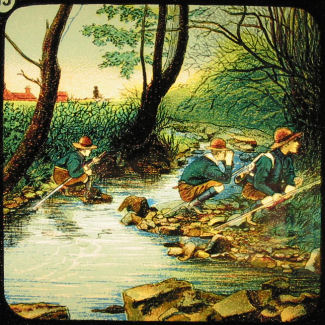 Suppose
we had wanted to make a bridge? " In India, in the Himalaya mountains, the
natives make bridges out of three ropes stretched across the river and
connected together every few yards by V-shaped sticks, so that one rope
forms the footpath and the other two make the handrail on either side. They
are jumpy bridges to walk across, but they take you over and they are easily
made." We've got some bits of string among us, but they wouldn't go very far
even for a bridge like that. And we have not got an axe to fell a tree -
that's another way. However, we don't want a bridge this time - we're over;
and the other patrol is in hiding just on the other side! They see us before we have time
to shelter, so we have to admit ourselves beaten at
"Scout meets Scout." Never mind, better luck next time.
Suppose
we had wanted to make a bridge? " In India, in the Himalaya mountains, the
natives make bridges out of three ropes stretched across the river and
connected together every few yards by V-shaped sticks, so that one rope
forms the footpath and the other two make the handrail on either side. They
are jumpy bridges to walk across, but they take you over and they are easily
made." We've got some bits of string among us, but they wouldn't go very far
even for a bridge like that. And we have not got an axe to fell a tree -
that's another way. However, we don't want a bridge this time - we're over;
and the other patrol is in hiding just on the other side! They see us before we have time
to shelter, so we have to admit ourselves beaten at
"Scout meets Scout." Never mind, better luck next time.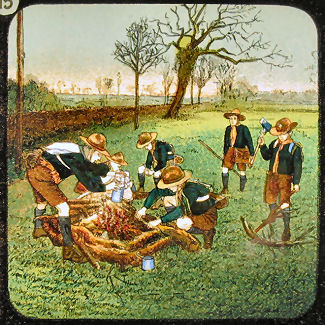 Remember
then in the first place to cut away or burn all bracken, heather, grass,
etc., round the fire; and do this carefully, a little at a time, and
have branches of trees or old sacks ready
with which you can beat it out again at once when it has gone far, enough.
And as to lighting the fire itself, this is how to do it, according to Gen.
Baden-Powell: "Remember to begin your fire with a small amount of very
small chips or twigs of really dry dead wood lightly heaped together, and a
little straw or paper to ignite it; about this should be put little sticks
leaning together in the shape of a pyramid, and above this bigger sticks
similarly standing on end. When the fire is well alight bigger sticks can be
added, and, finally, logs of wood." There's a little rhyme in the book
called "Two Little ' Savages," which puts the thing very nicely:
Remember
then in the first place to cut away or burn all bracken, heather, grass,
etc., round the fire; and do this carefully, a little at a time, and
have branches of trees or old sacks ready
with which you can beat it out again at once when it has gone far, enough.
And as to lighting the fire itself, this is how to do it, according to Gen.
Baden-Powell: "Remember to begin your fire with a small amount of very
small chips or twigs of really dry dead wood lightly heaped together, and a
little straw or paper to ignite it; about this should be put little sticks
leaning together in the shape of a pyramid, and above this bigger sticks
similarly standing on end. When the fire is well alight bigger sticks can be
added, and, finally, logs of wood." There's a little rhyme in the book
called "Two Little ' Savages," which puts the thing very nicely: